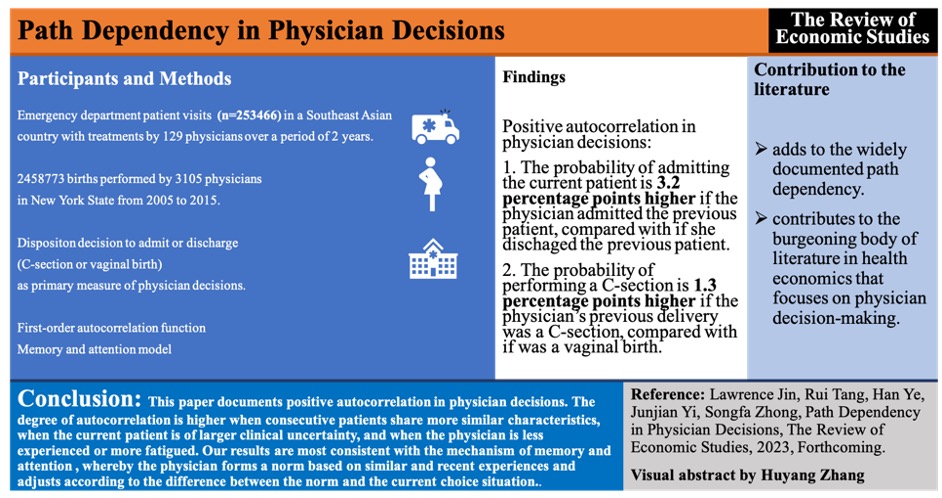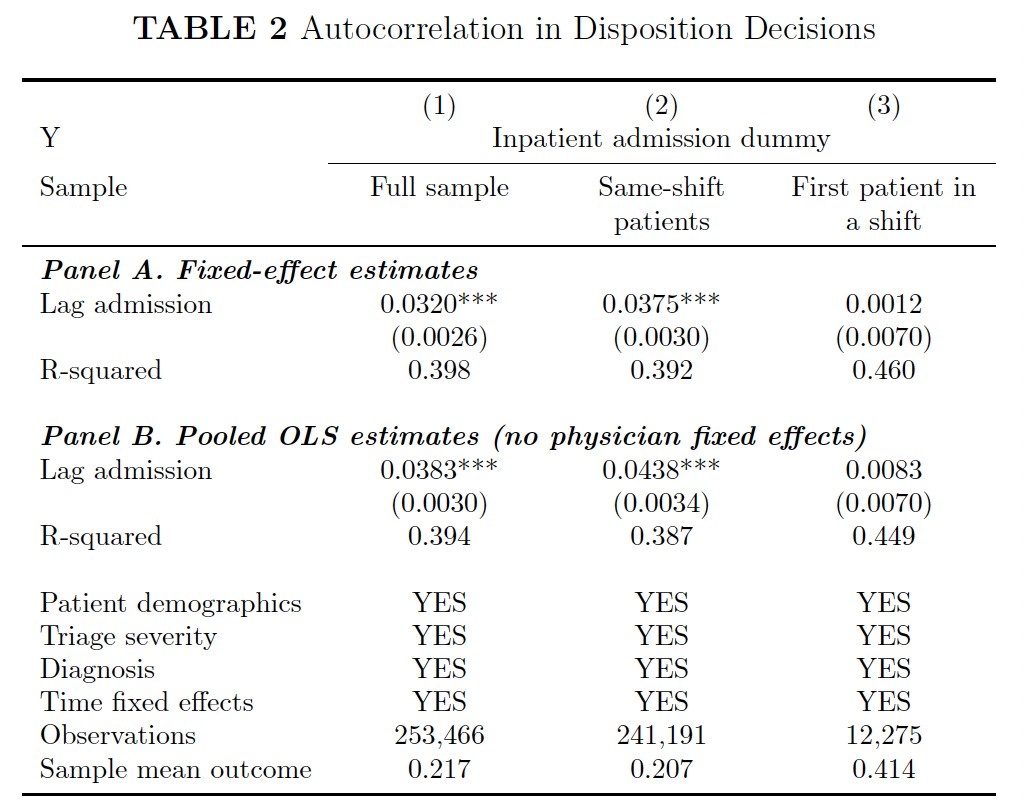Professor Yi Junjian, a dual-hired professor at the Institute for Global Health and Development, along with collaborators, published an academic paper titled "Path Dependency in Physician Decisions" in The Review of Economic Studies on September 24, 2023. The research, conducted by teams from Peking University, Hong Kong University of Science and Technology, Lingnan University in Hong Kong, and the National University of Singapore, explores path dependence in clinical decisions made by emergency physicians and obstetricians. The study utilizes models from memory and attention theory to explain the mechanisms behind path dependence in clinical decision-making.
Abstract Poster

Research Background
The literature in behavioral economics has long indicated that individuals, including experts, often use heuristic rules as shortcuts for quick decision-making, leading to various cognitive biases (Kahneman, 2011). In medical environments, due to medical emergencies and excessive workloads, physicians must make rapid decisions in high-pressure situations with insufficient information. In this regard, as noted by renowned physician Jerome Groopman from Harvard Medical School, doctors need to understand heuristic rules and the associated biases and errors. Meanwhile, as observed by Chandra, Handel, and Schwartzstein (2019), "there is relatively less work studying behavioral economics in physician treatment decisions." This study contributes to the growing literature on behavioral aspects of physician decisions (Chan, 2016, 2018; Gong, 2017; Li, Dow, and Kariv, 2017; Chen, 2021; Silver, 2021).
This study provides further evidence for path dependence literature, which can be explained as supporting assimilation or contrast effects in successive decisions. Evidence for assimilation effects is found in perceptual decision-making, belief updating tasks, evaluation of Olympic gymnasts' performance, lottery choice tasks, article ratings, and jury decisions in criminal trials. Contrast effects are also supported in the literature, including people moving from one city to another, speed dating participants, interviewers, as well as shelter judges, loan officers, and baseball umpires.
The study also contributes to the growing literature in health economics focusing on physician decisions. Physician performance depends not only on their skills and productivity but also on their preferences and the surrounding environment. For example, physicians are incentivized to perform unnecessary medical procedures due to legal liability and financial incentives, and to report more high-intensity service codes to receive higher medical insurance reimbursements than they actually provide. In recent research, Chen (2021) found that past collaborations among physicians enhanced team productivity. In an emergency department setting, Silver (2021) studied peer effects and found that faster peer physicians prompted doctors to speed up and reduce care. In another emergency department setting, Chan (2018) documented behavioral distortions exhibited by physicians near the end of shifts. Mullainathan and Obermeyer (2022) used machine learning to study physician decisions and found the coexistence of over- and under-provision, indicating systemic errors in clinical decision-making. Singh (2021) also found sequential effects in the childbirth environment, where physicians are generally more likely to continue using the same delivery method for subsequent patients but switch to another method when complications arise in the previous patient. Yi’s recently published study contributes to the literature by providing strong empirical evidence of path dependence in physician decisions and demonstrating that results can be explained through models of memory and attention theory (Bordalo, Gennaioli, and Shleifer, 2020), thus adding to the literature.
Data Description
This study utilized two types of data:
1) Emergency department data from a Southeast Asian country from January 1, 2011, to December 31, 2012. After screening, a total of 253,466 patient visits and 129 attending physicians were included. The data recorded characteristics of each emergency department patient, attending physician ID, clinical decisions, and timestamps of patients' pathways through the emergency department. The primary physician decision metric was whether to admit the emergency department patient.
2) Obstetric delivery data from New York State, USA, from January 1, 2005, to December 31, 2015. After screening, a total of 2,458,773 deliveries and 3,105 physicians were included. The data recorded characteristics of each pregnant woman, attending physician ID, clinical decisions, and timestamps of surgeries. The primary physician decision metric was whether to perform a cesarean section for pregnant women.
Empirical Method
The empirical research of this study consists of three parts.
1) The first part focuses on the emergency department data, examining the impact of physicians' previous decisions on hospital admission decisions for current patients.
2) The second part focuses on obstetric delivery data, investigating the influence of physicians' previous decisions on the likelihood of performing cesarean sections for current patients
3) The third part conducts mechanism research, applying Bordalo et al.'s theory of memory and attention to path dependence in physician decision-making.
Empirical Results

Researchers found that doctors' decisions typically exhibit positive autocorrelation and the degree of autocorrelation is greater when the current patient is closer in time or more similar in characteristics of the previous patient.
Author Backgrounds

Lawrence Jin, an Assistant Professor at the National University of Singapore, specializes in behavioral economics, health economics, and cost-benefit analysis. His work has been published in The Review of Economic Studies , Economic Modelling , AEA Papers and Proceedings , and the Journal of Economic Behavior & Organization .

Tang Rui, Assistant Professor at the Hong Kong University of Science and Technology, specializes in decision theory, economic theory, microeconomics, behavioral economics, and health economics. His research findings have been published in The Review of Economic Studies , Games and Economic Behavior , and AEA Papers and Proceedings .

Yi Junjian is a distinguished professor at Peking University and a professor of economics at the National School of Development. He is also a dual-appointed professor at the Institute for Global Health and Development. He obtained his Ph.D. from the Chinese University of Hong Kong in 2011. From 2011 to 2014, he conducted postdoctoral research at the University of Chicago's Department of Economics under the supervision of James Heckman (Nobel Laureate in Economics, 2000) and Gary Becker (Nobel Laureate in Economics, 1992). From 2014 to 2020, he served as an assistant professor in the Department of Economics at the National University of Singapore. In 2021, he became an associate professor in the Department of Economics at the Chinese University of Hong Kong. Professor Yi is currently a distinguished professor at Peking University. His research interests focus on health and medical economics, big data analysis in healthcare and health, artificial intelligence economics, human capital theory, labor and population economics, development economics, econometrics, and behavioral economics. His research findings have been published in academic journals in the fields of economics, management, public health, and demography, including the Journal of Political Economy , Review of Economic Studies , Management Science , Demography , Lancet , and Proceedings of the National Academy of Sciences .

Ye Han, Assistant Professor at Lingnan University in Hong Kong, specializes in health economics, behavioral economics, labor economics, and applied microeconometrics. His research findings have been published in The Review of Economic Studies , Review of Economics and Statistics , AEA Papers and Proceedings , and Management World .
Zhong Songfa, a Professor at the Hong Kong University of Science and Technology, specializes in behavioral economics, experimental economics, and genoeconomics. His research findings have been published in The Review of Economic Studies , Quantitative Economics , Review of Economics and Statistics , Proceedings of the National Academy of Sciences , and the American Economic Review .
(Interpreted by Waverly Shi)